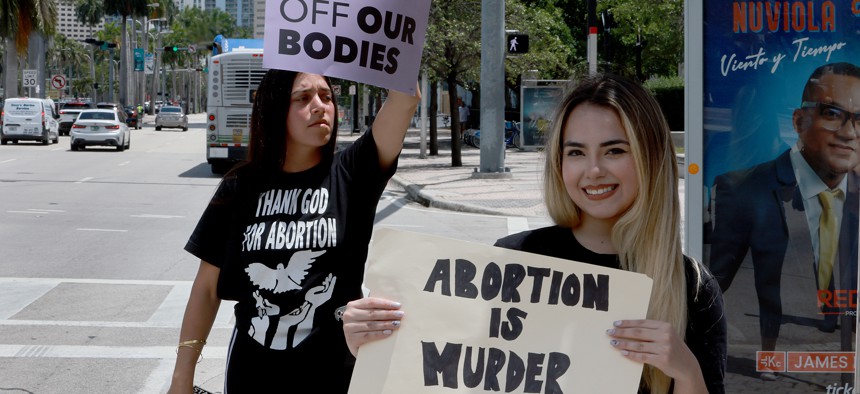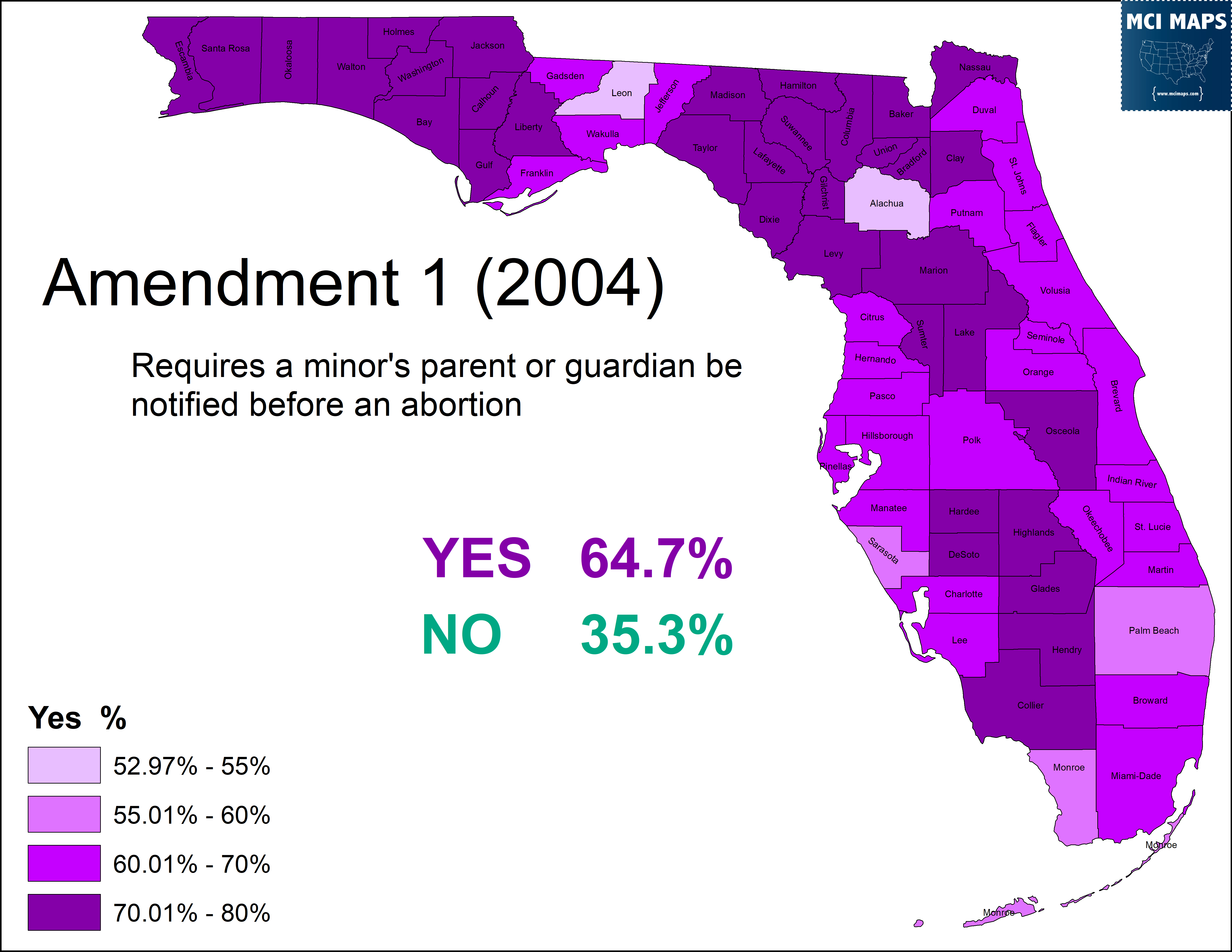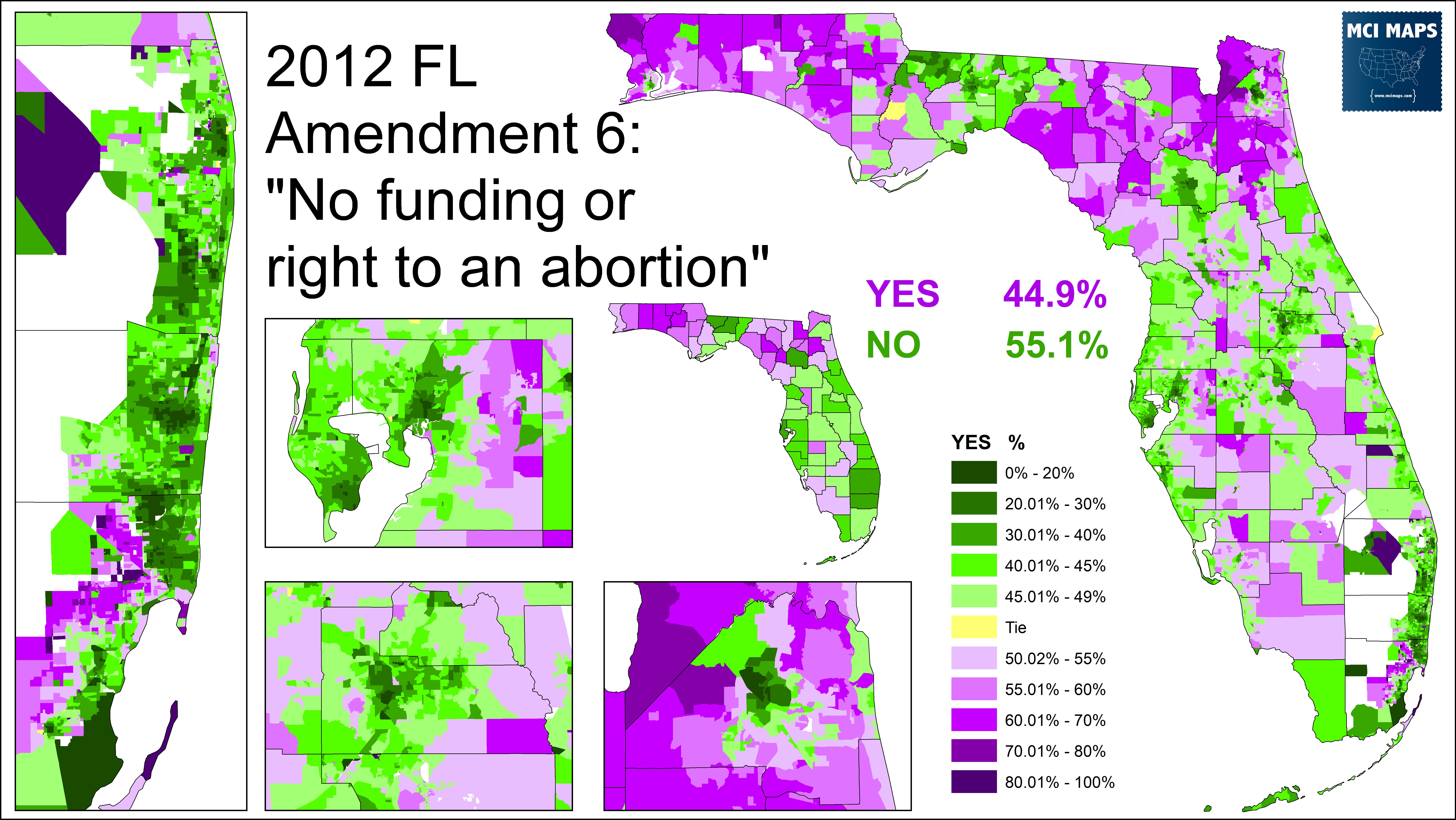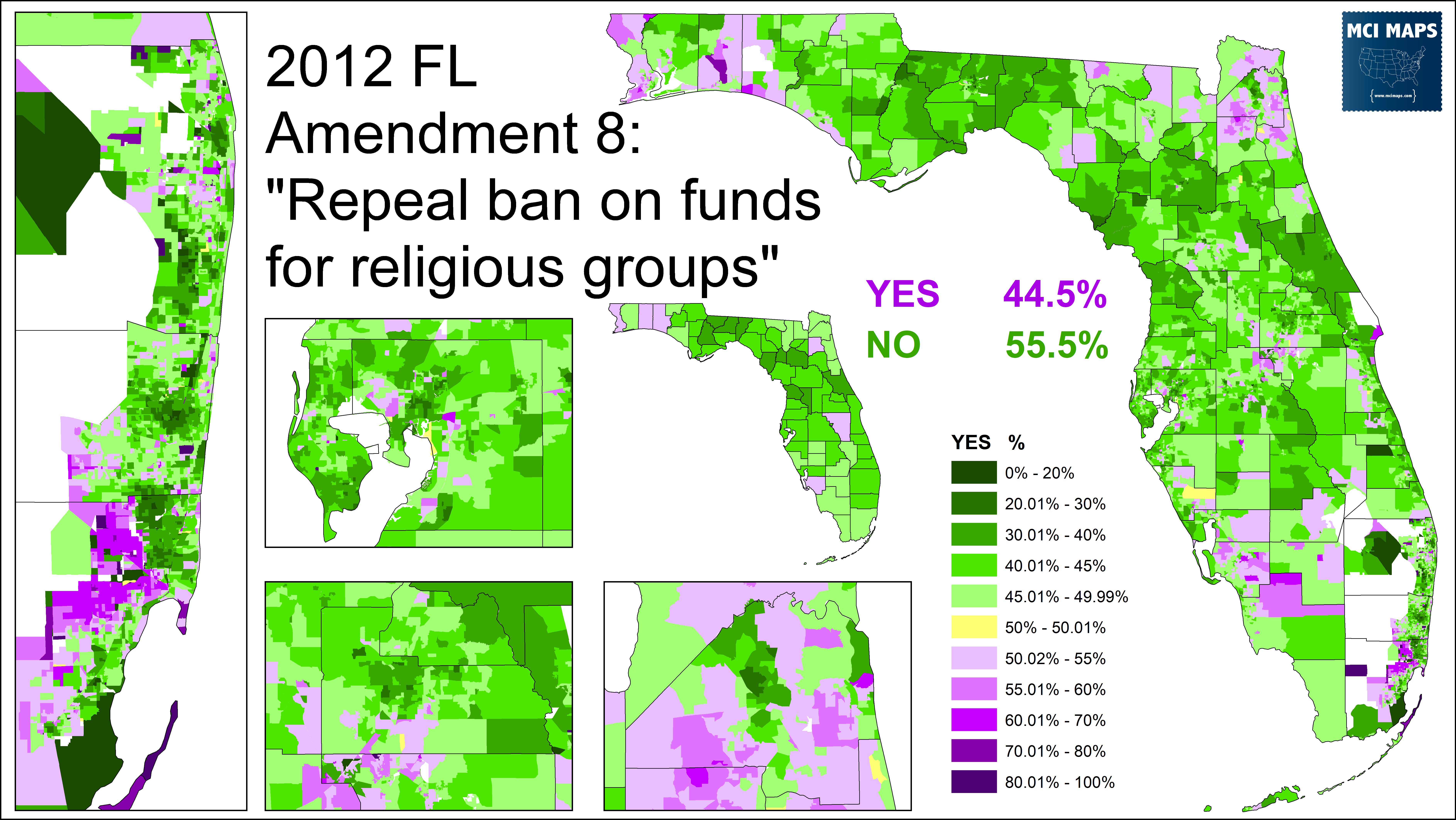On privacy, parents and public funds: A history of abortion on Florida's ballot
Matthew Isbell looks at the key votes to consider in the abortion issue's trek through Florida policy and politics.

Amanda Guerra, right, holds a sign reading, 'Abortion is Murder,' as she counter-protests during a rally supporting the right for abortions to be protected by the federal government on May 3, 2022 in Miami. Photo by Joe Raedle/Getty Images
The repeal of Roe v. Wade has made abortion a state-by-state fight, at least in the short term. In the wake of the Supreme Court’s decision, Florida’s own laws have been subject to examination. Abortion remains legal in Florida, with a 15-week ban currently being challenged in the courts. Multiple states banned abortion after the repeal of Roe, often with “trigger laws” that kicked in once the court decision came down.
Gov. Ron DeSantis and GOP leaders have not adhered to calls from pro-life activists to call a special session on banning or further limiting abortion. The answer is fairly straightforward: DeSantis wants to wait until after the election. A full ban on abortion would no doubt be unpopular in a politically divided state. DeSantis, who I believe has his eyes on the presidency, does not want to risk hurting his re-election. At the same time, he will likely push a total ban, or 6-week ban, after the election – something to help him in 2024.
DeSantis’ calculation comes from a reading of polls and history. Abortion politics has been on Florida’s ballot several times. The state also has a privacy protection that has been cited by the Florida courts in the past when ruling on abortion. In light of the recent national news, I decided to take a look at Florida’s privacy and abortion referendums.

1980 Privacy Referendum
One factor in Florida’s abortion debate is the state constitution’s right to privacy. This right stems from a 1980 ballot measure that voters approved by 60%. The proposal, put on the ballot by the legislature, says, “Every natural person has the right to be let alone and free from governmental intrusion into his private life except as otherwise provided herein. This section shall not be construed to limit the public’s right of access to public records and meetings as provided by law.”
The language passed the Legislature with near-unanimous support. One uniting factor was the expansion of technology. The worries of warrantless wiretaps and other tech-fueled invasions drove many to back the measure under the mantra of resistance from “big government.”
This vote came 8 years after Roe v. Wade. Depending on whom you ask, affirming the right to privacy was either an extension of backing abortion rights, or unrelated (although recent reporting by the USA TODAY Network-Florida says the state constitution’s right to privacy was in fact designed to “encompass abortion.”) During the debate and vote on the amendment, abortion rarely came up. The proposal generated far more controversy around gay rights and crime.
The amendment was broad and fairly vague, asserting a strong right to privacy with no standard for when state interest could override the right. On one hand, this caused many in law enforcement, especially prosecutors, to come out against the amendment on grounds it could impede investigations. On the other hand, gay rights activists backed the amendment as a way to protect individuals from anti-sodomy and anti-cohabitation laws still on the books. These campaign talking points upset many of the amendment’s legislative sponsors, who insisted the talking points were well beyond what the amendment was about.
The measure only failed in a handful of counties, and mostly the more conservative ones. Most counties were fairly divided on the measure, with few landslides. I believe this reflects the large number of scattered opinions on the text itself. Either way, the desire of voters for some degree of privacy outweighed all else.

2004 Parental Notification Referendum
Abortion showed up on Florida’s ballot in 2004. This was the culmination of multiple court cases over privacy. In 1989, the Florida Supreme Court had struck down a parental consent law, finding a right to privacy for minors seeking to end pregnancy. In 2003, the court struck down a parental notification law. The law specifically mandated the parents of a minor seeking an abortion to be notified, but consent was not needed. Those opposed to the law argued that children afraid to tell their parents would seek unsafe, underground abortions. The court struck down this statute, and did refer to the privacy amendment of 1980.
The Legislature then voted to put the parental notification measure on the 2004 ballot as a constitutional amendment. The text of the measure reads:
“The Legislature shall not limit or deny the privacy right guaranteed to a minor under the United States Constitution as interpreted by the United States Supreme Court. Notwithstanding a minor’s right of privacy provided in Section 23 of Article I, the Legislature is authorized to require by general law for notification to a parent or guardian of a minor before the termination of the minor’s pregnancy. The Legislature shall provide exceptions to such requirement for notification and shall create a process for judicial waiver of the notification.”
The text clearly aims to be framed not as an attack on Roe itself, but rather a request for an exception to the privacy rules of Florida. The text tries to be as inoffensive as possible, by drawing in pro-choice voters who also did not like the idea of children operating outside parental guidance. The measure easily passed, winning in every county.
The broad support for the amendment matches with polls that show most voters favor parental involvement. This is also a good example of the tricky notion of categorizing voters as “pro-choice” or “pro-life.” How a person votes on any issue around abortion can vary based on the specifics.

2012 Referendum
Abortion showed up on the Florida ballot again in 2012. The legislature added an Amendment to the 2012 ballot:
“This proposed amendment provides that public funds may not be expended for any abortion or for health-benefits coverage that includes coverage of abortion. This prohibition does not apply to an expenditure required by federal law, a case in which a woman suffers from a physical disorder, physical injury, or physical illness that would place her in danger of death unless an abortion is performed, or a case of rape or incest.
“This proposed amendment provides that the State Constitution may not be interpreted to create broader rights to an abortion than those contained in the United States Constitution. With respect to abortion, this proposed amendment overrules court decisions which conclude that the right of privacy under Article I, Section 23 of the State Constitution is broader in scope than that of the United States Constitution.”
The amendment, in effect, had two components: One codified into state law what federal law already did, which is that public funds can’t go toward abortion. This would have also applied to the private insurance of employees who worked for the state. The second aimed to specifically separate abortion from the right to privacy in Florida’s constitution. If passed, this would have meant the only thing preventing a ban on abortion would have been Roe v. Wade; rather than Roe and the state’s privacy protection.
The amendment, part of a litany of conservative proposals put on the 2012 ballot, was fiercely debated, generating millions in spending. Advocates for the proposal also highlighted that a narrowing of the privacy rule would allow lawmakers to pass a parental consent law because the state’s privacy provision wouldn’t hinder it. In the end, the measure failed, not even securing 50%. Since 60% was needed for passage, the measure always had a long shot at succeeding. It fell along with the other conservative amendments.
The proposal was largely confined to rural communities for support. Many GOP-leaning suburbs rejected the proposal, as did Democratic communities and red-trending working-class blocks. The strongest urban block for the amendment was the Cuban community (which has a long Catholic tradition) in Miami-Dade County. The non-Cuban Hispanic community, especially out of South Florida, was largely against the measure, which failed along with several other GOP-backed proposals.

One of the other conservative ballot measures was Amendment 8, which would have repealed the state ban on funding religious groups. This proposal got around the same share of the vote, but has different coalitions. The religious funding proposal was strong in some rural communities. Some of its strongest support, however, was in the Cuban community. Unlike on the abortion referendum, the Puerto Rican community of Orlando was more on board with this as well. Many religious, Hispanic organizations backed the measure.
The rejection of these ballot measures came the same day Barack Obama was winning his re-election in Florida. How did the abortion vote compare to the presidential contest? I looked at the Obama share of the vote compared to a ‘no’ vote on the amendment. The results are below. Blue is ‘no’ outperforming Obama, while orange is ‘no’ underperforming Obama.
The results show that, by and large, white voters were stronger for ‘no’ than they were for Obama. This includes working class, rural, and suburban whites. On the other hand, Hispanic and black voters were not as strong in the ‘no’ camp as they were for Obama. Precincts over 80% black rejected the amendment by a 20-80% margin, which is huge but not quite the 97% Obama got. The Orlando precincts with large Puerto Rican populations rejected the amendment 42%-58%, while backing Obama with 74%. In Miami-Dade, ‘no’ underperformed Obama by varying degrees in the Hispanic community as well, varying by nationality. Cuban voters specifically backed the amendment around 62%-38%, while Romney was in the low- to mid-50s.
The rejection of the amendment is by far the biggest notch in the pro-choice camp when it comes to articulating where Florida stands on the issue.
Looking Ahead
So does Florida’s current set of constitutional provisions protect abortion? Legally, I would agree with that it does. Does that matter to the newly-conservative Florida Supreme Court? I have my doubts. As I said previously, on Florida’s 2008 same-sex marriage referendum, any group looking to assert its rights should not turn to these courts for protection. Pro-choice groups, if they want to be sure, may need to start working toward a 2024 ballot measure.
Matthew Isbell is a Democratic data consultant and redistricting expert who writes about Florida politics at mcimaps.com and on Substack. A version of this article previously appeared on The MCIMAPS Report.
NEXT STORY: Ask the Experts: How did the GOP get the voter registration edge in Florida?